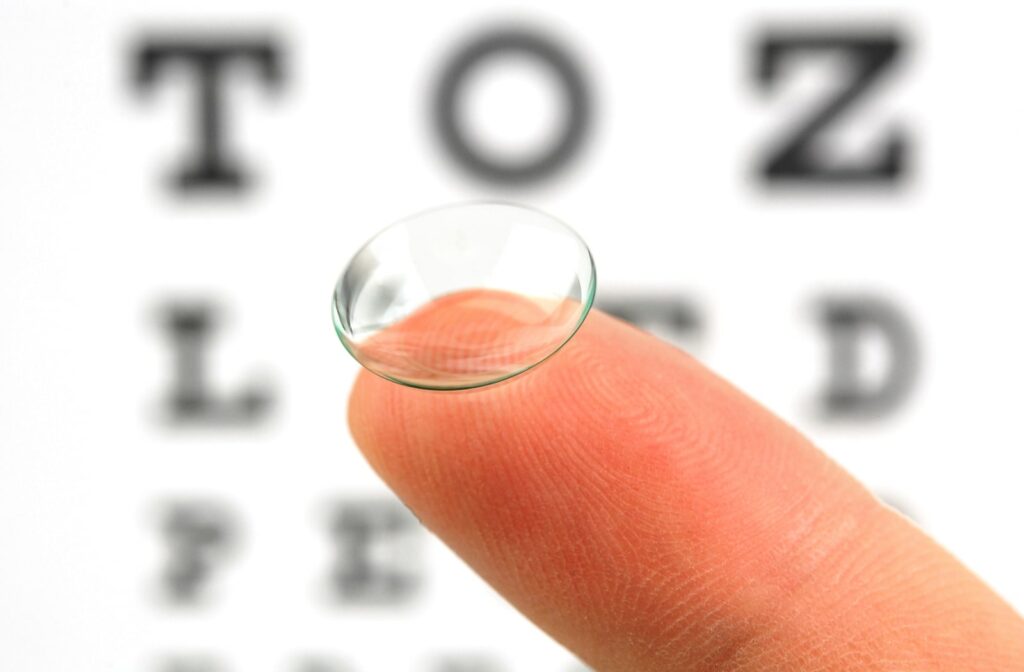Glasses are incredible advancements in medical technology that can correct various vision problems. However, they are not suitable for everyone’s lifestyle. Contact sports or manual jobs requiring eye protection make contact lenses more desirable in many situations.
If you’ve never had contact lenses, you’ll need to book a contact lens fitting exam. Even if you’ve received a comprehensive eye exam recently, it’s unlikely that the eye doctor took the necessary measurements of your eye for contact lenses.
What’s Included in a Comprehensive Eye Exam
To understand how a contact lens eye test is different, we need to look at a comprehensive eye exam. One might assume that this exam would include everything; after all, it is “comprehensive.”
Vision correction is only a part of what a comprehensive eye exam includes. The main focus of this type of test is overall eye health. Typically this exam begins with your eye doctor asking you a bunch of questions about your health, personal and family history, current medications, etc.
Then, in addition to figuring out your visual acuity, the eye doctor will run several tests to determine your overall eye health. They can tell whether you have (or are at risk of getting) any eye diseases or problematic eye conditions.
Here are the common tests or assessments you may get during a comprehensive eye exam:
- Detailed history and analysis of vision needs
- Measurements of visual acuity and refractive error
- Binocular vision assessment
- Overall eye health assessment
- Assessment of colour vision
- Neurological evaluation of your vision system
- Glaucoma screening
In addition to these tests, the eye doctor may run several other tests, including various scans or imaging of the eye if he suspects there may be further issues.
Additional Eye Test for Contact Lenses
It’s not that a contact lens fitting exam is different from a comprehensive eye exam. Because most eye doctors will want to perform a complete eye exam in addition to the fitting. Your eye health and history play significant roles in what (or if) contacts are an option for you.
Unless you’ve had the complete examination recently, you’ll usually be booked for everything at one appointment when you book a contact lens fitting.
In addition to everything mentioned above, here are some things you can expect to happen during the “fitting” portion of your appointment:
- Measurements of various parts of your eye— the cornea, pupil, and iris. This ensures the eye doctor can recommend contact lenses that fit your eye properly to prevent irritation or discomfort.
- The eye doctor will evaluate your tear film to avoid dry eye syndrome (common in contact lens wearers). Doing this ensures that your eye produces an adequate amount of high-quality tears.
- After completing these extra assessments, you’ll typically be prescribed a trial pair of the recommended contact lenses and booked for a follow-up appointment to ensure they fit and are comfortable.
How Often Should You Get a Contact Lens Exam
According to the Canadian Association of Optometrists (CAO), most adults should get exams every two years until they are 65. However, some eye doctors recommend getting an exam annually for those who wear contacts. Your doctor will likely provide you with their professional recommendation based on your eye health during your exam.
Preparing for the Eye Test
There isn’t much you need to do to prepare for a contact lens fitting. However, the optometrist will likely dilate your eyes if you’re getting a comprehensive eye exam. So, driving afterwards may be uncomfortable (and unsafe).
Many clinics have policies stating that you must be released to a friend or family member who will drive you home.
Can You Avoid an Eye Test for Contact Lenses
If you’d really prefer not to get another eye examination, there are some instances where you can get contact lenses without an eye test.
First, you need a valid prescription to order contact lenses. Typically these prescriptions expire every two years. So, at the very least, you may need an eye doctor to update your prescription, which can be done without a comprehensive exam.
Second, you have to be fitted for a particular lens. When the eye doctor does a contact lens fitting exam, they take precise measurements, determining the brand and type of contact lens they prescribe.
You shouldn’t have a problem getting contacts if you have these two things in place. However, eye examinations are a good thing. They help detect problems in your eyes or vision early and give you the best chance of not suffering any long-term effects.
Book Your Eye Test for Contact Lenses
If you’re sick of wearing glasses and ready to try out contact lenses, give our office a shout. The friendly staff at Toronto Center Eye Care are happy to answer any questions and book you for the exam and fitting at a convenient time.



